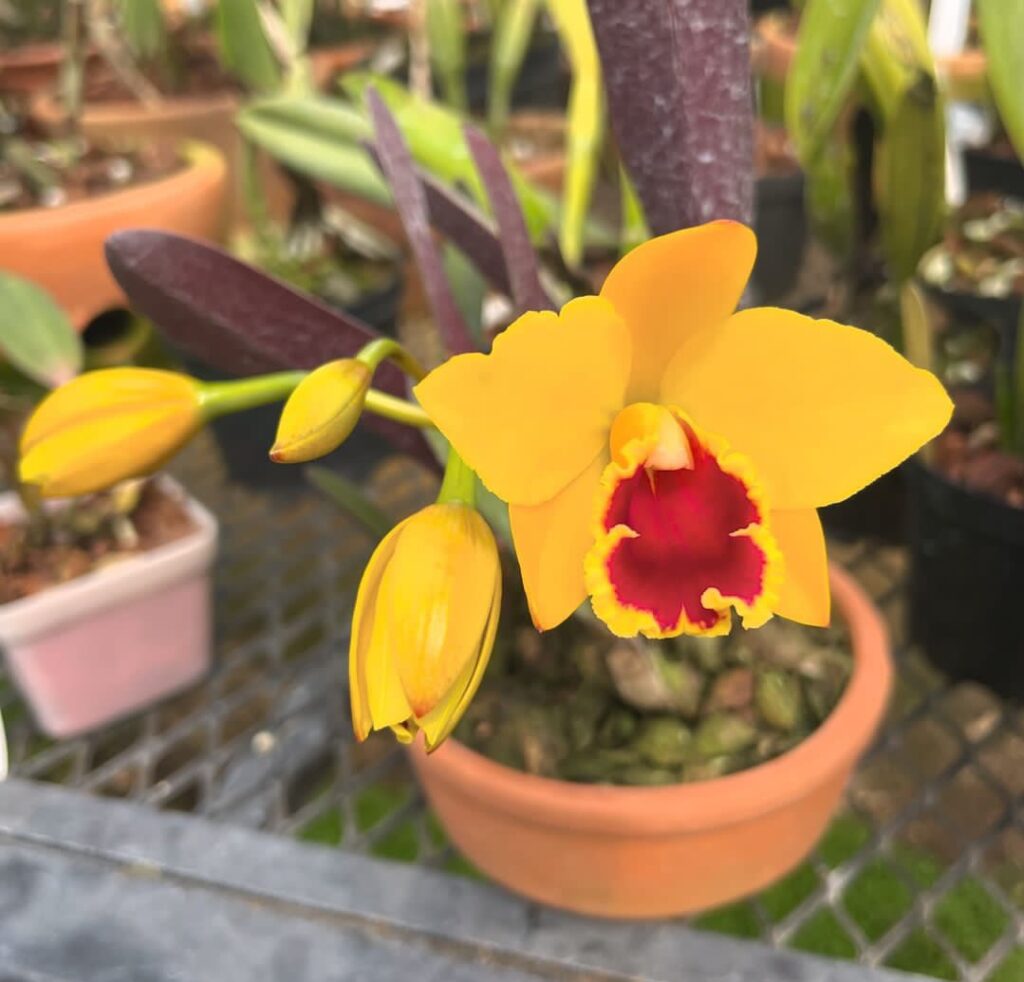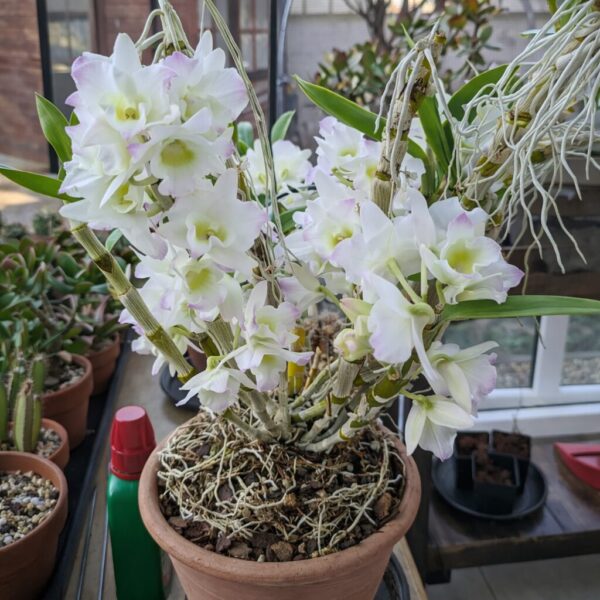
DIY Orchid Fertilizer 101: Supercharge Growth with Proven Recipes for Various Varieties.
Feel free to share!
Table of Contents 👈 Tap Here
DIY Orchid Fertilizers 101 Enhancing the beauty and vitality of orchids doesn’t always require store-bought fertilisers. In fact, you can create your own homemade orchid fertiliser using simple ingredients found in your kitchen or garden. These DIY fertilisers not only offer a cost-effective alternative but also allow you to tailor the nutrients to the specific needs of different orchid varieties.
From the elegant Phalaenopsis to the vibrant Cattleya, each orchid type benefits from distinct homemade fertilisers. In this guide, we will explore various orchid types and provide you with easy-to-follow recipes for homemade fertilisers, allowing you to nurture your beloved orchids with personalised care and watch them flourish with natural nourishment.”
How to properly care for your orchids with home-made fertiliser
Proper care for orchids with homemade fertilisers involves a step-by-step approach. Begin by selecting a suitable homemade fertiliser for your specific orchid variety. Dilute the fertiliser according to the provided instructions to avoid overfertilization.
Ensure your orchid is adequately watered before applying the diluted fertiliser, allowing the water to drain completely. Apply the homemade fertiliser slowly and evenly around the base of the plant, avoiding the leaves. Observe your orchids closely for signs of healthy growth and adjust the fertilisation schedule or dilution strength if needed. Maintain appropriate growing conditions, such as proper lighting, temperature, and humidity levels. Regularly monitor your orchids’ nutritional needs and make adjustments to the fertilisation schedule accordingly.
By following these steps and providing personalised care, your orchids will flourish with the benefits of homemade fertilisers, displaying their vibrant blooms as a testament to their well-being.
There are numerous types of orchids, each with its own unique characteristics and growing requirements. However, when it comes to homemade orchid fertilisers, there are a few common options you can consider. Here are four types of orchids and suggestions on how to make homemade fertiliser for them .keep reading
Phalaenopsis Orchids

Banana Peel Fertiliser: Soak a banana peel in water for a few days. Use the water to water your orchid. The decomposing peel releases potassium and other nutrients that benefit Phalaenopsis orchids. This frequency provides a regular supply of potassium and nutrients to support the growth and flowering of your orchid.
Epsom Salt Solution: Dissolve 1 teaspoon of Epsom salt in 1 gallon of water. Use this solution to water your orchid once a month. The magnesium in Epsom salt can promote blooming. Apply the Epsom salt solution to your orchid once a month. This periodic application ensures a steady supply of magnesium, which can benefit the foliage and blooming of your orchid.
Cattleya Orchids:

Eggshell Fertiliser: Crush dried eggshells into small pieces. Sprinkle them around the base of your orchid. Eggshells are a good source of calcium, which can enhance the growth and strength of Cattleya orchids.
Green Tea Fertiliser: After brewing a cup of green tea, allow the tea bag to cool. Place the tea bag in a container with water and let it steep overnight. Use this solution to water your orchid. The nutrients in green tea can be beneficial for Cattleya orchids.
Dendrobium Orchids:

Rice Water Fertiliser: After cooking rice, save the water used for rinsing. Allow it to cool, and then use it to water your orchid. Rice water contains beneficial nutrients that can aid in the growth of Dendrobium orchids.
Fish Emulsion Fertiliser: Mix 1 part fish emulsion with 3 parts water. Apply this mixture to your orchid once a month. Fish emulsion provides a balanced source of nutrients for Dendrobium orchids.
Oncidium Orchids:

Coffee Grounds Fertiliser: After brewing coffee, spread the used coffee grounds around the base of your orchid. Coffee grounds can provide essential minerals and organic matter to support the growth of Oncidium orchids.
Molasses Solution: Mix 1 tablespoon of molasses with 1 gallon of water. Use this solution to water your orchid every few weeks. Molasses contains trace minerals and sugars that can benefit Oncidium orchids.
Miltonia Orchids:

Tea Bag Fertiliser: After brewing a cup of tea, allow the tea bag to cool. Place the tea bag in a container with water and let it steep for a few hours. Use this solution to water your Miltonia orchid. The tannins in tea can provide beneficial nutrients to promote healthy growth.
Seaweed Extract Fertiliser: Dilute seaweed extract according to the instructions on the package. Apply this solution to your orchid once every few weeks. Seaweed extract is rich in minerals and growth-promoting substances that can benefit Miltonia orchids.
Vanda Orchids:

Crushed Aspirin Solution: Dissolve one aspirin tablet in a gallon of water. Use this solution to mist the aerial roots of your Vanda orchid. Aspirin contains salicylic acid, which can stimulate growth and enhance the plant’s immune system.
Rice Vinegar Fertiliser: Mix 1 tablespoon of rice vinegar with 1 gallon of water. Use this solution to water your Vanda orchid once a month. Rice vinegar provides a mild source of acidity and nutrients that can support the plant’s growth.
Lady Slipper Orchids (Paphiopedilum):
Cinnamon Powder: Sprinkle a small amount of cinnamon powder on the potting medium of your Lady Slipper orchid. Cinnamon has antifungal properties that can help prevent root rot and fungal diseases.
Eggshell Tea: Crush dried eggshells and steep them in water for a day or two. Strain the liquid and use it to water your orchid. The calcium-rich eggshell tea can benefit the growth and health of Lady Slipper orchids.
Cymbidium Orchids:

Banana Water: Blend a ripe banana with water to create a smooth mixture. Dilute the mixture with additional water and use it to water your Cymbidium orchid. Bananas provide potassium and other nutrients that can promote flowering and overall plant health.
Worm Casting Tea: Steep a handful of worm castings in water for a few days. Strain the liquid and use it to water your orchid. Worm castings contain beneficial microorganisms and nutrients that can enrich the soil and support the growth of Cymbidium orchids.
Remember to adjust the frequency of fertilisation based on your orchid’s specific needs and monitor how they respond to the homemade fertilisers. Regular observation and care are key to maintaining healthy and thriving orchids.
What are the benefits of home-made orchid fertiliser?
Homemade orchid fertilisers offer several benefits for orchid care:
Homemade orchid fertilisers offer several benefits for orchid care:
Cost-effective: Homemade fertilisers are often made from easily accessible and inexpensive ingredients, such as kitchen scraps or common household items. By making your own fertilisers, you can save money compared to purchasing commercial orchid fertilisers.
Customizable Nutrients: Homemade fertilisers allow you to tailor the nutrient composition to the specific needs of your orchids. Different orchid varieties have varying nutritional requirements, and homemade fertilisers can be adjusted accordingly. This customization ensures that your orchids receive the specific nutrients they need for optimal growth and flowering.
Natural and Organic: Homemade fertilisers often utilise organic materials, such as fruit peels, tea bags, or compost, providing a more natural approach to orchid care. Organic fertilisers can promote healthy soil microbial activity, improve nutrient availability, and enhance overall plant vitality.
Reduced Risk of Over-Fertilisation: Homemade fertilisers, when used correctly and in moderation, can help reduce the risk of over-fertilisation. Over-fertilisation can lead to nutrient imbalances, salt buildup in the potting medium, and potential damage to the orchid’s delicate roots. Homemade fertilisers allow for better control of nutrient concentration and application frequency.
Environmental Sustainability: By making your own orchid fertilisers, you have more control over the ingredients used and can opt for eco-friendly and sustainable practises. Using organic waste materials for homemade fertilisers reduces waste and promotes a more environmentally conscious approach to orchid care.
Personalised Care: Homemade fertilisers enable you to provide personalised care for your orchids. You can experiment with different ingredients, ratios, and application methods to find what works best for your specific orchid varieties. This hands-on approach allows you to develop a deeper connection with your plants and cater to their individual needs.
FAQ
FAQ 1: What is a homemade fertilizer for orchids and how does it work?
A DIY Orchid Fertilizer is a homemade plant feed made from mild, natural ingredients that gently support orchid growth. It works by supplying small amounts of nutrients like potassium, calcium, and trace minerals without overwhelming sensitive orchid roots. Because orchids naturally grow in low-nutrient environments, these diluted solutions help improve leaf health, root strength, and blooming when used correctly.
FAQ 2: Can kitchen waste really help orchids grow better?
Yes, common kitchen waste can be useful when prepared properly as a DIY Orchid Fertilizer. Items like banana peels, rice water, and eggshells contain nutrients orchids can absorb in small doses. When diluted and applied occasionally, these materials support steady growth and reduce dependence on chemical products, while remaining gentle on delicate orchid roots.
FAQ 3: How often should homemade orchid fertilizer be applied?
When using a DIY Orchid Fertilizer, less is always better. Most orchids benefit from feeding once every two to three weeks during active growth. Overuse can cause salt buildup or root stress. Always water the orchid first, then apply the diluted fertilizer, allowing nutrients to absorb slowly without shocking the plant.
FAQ 4: Is homemade fertilizer safe for all orchid types?
When used sparingly and appropriately diluted, the majority of orchid types can withstand DIY orchid fertiliser. Cattleya, Dendrobium, and Phalaenopsis orchids all benefit from mild organic diets. However, further dilution could be needed for sensitive species. It is possible to avoid root damage or leaf burn by testing one plant before using it extensively.
FAQ 5: Can banana peels be used to fertilize orchids?
Banana peels are commonly used in a DIY Orchid Fertilizer because they contain potassium, which supports flowering. Soaking peels in water and using the strained liquid provides mild nutrition. The solution must be diluted and applied sparingly, as orchids cannot tolerate strong organic residues around their roots.
FAQ 6: Does rice water benefit orchid growth?
Rice water is popular in DIY Orchid Fertilizer recipes due to its trace minerals and light starch content. When diluted, it supports root activity and leaf growth without overwhelming the plant. Only use plain rice water without salt or spices, and apply it occasionally to avoid residue buildup
.
FAQ 7: Can eggshells help orchids grow stronger roots?
Eggshells are rich in calcium and are often included in DIY Orchid Fertilizer preparations. Crushed shells soaked in water release minerals slowly, helping strengthen roots and leaves. The liquid should always be strained and diluted before use, as solid particles can harm orchid roots if applied directly.
FAQ 8: Is homemade fertilizer better than store-bought options?
A DIY Orchid Fertilizer offers a natural, low-cost alternative to commercial products, especially for gentle feeding. While store-bought fertilizers provide precise nutrient ratios, homemade options reduce chemical exposure and allow more control. Many growers use both methods together for balanced orchid care.
FAQ 9: Can DIY fertilizer improve orchid blooming?
Yes, when used correctly, a DIY Orchid Fertilizer can support better blooms by improving overall plant health. Nutrients like potassium and calcium encourage bud formation and strong flower stems. Consistent light feeding, proper lighting, and correct watering habits together influence flowering success.
FAQ 10: What mistakes should be avoided with homemade orchid fertilizer?
Common mistakes with DIY Orchid Fertilizer include using solutions that are too strong or applying them too frequently. Orchids dislike nutrient overload, which can damage roots. Another error is applying fertilizer to dry roots, which increases the risk of burning and long-term stress.
FAQ 11: Can coffee or tea be used in orchid fertilizer?
Used sparingly, diluted tea can be part of a DIY Orchid Fertilizer, but coffee is usually too acidic. Orchids prefer neutral conditions, so any acidic liquid must be heavily diluted. Overuse can alter the growing medium’s pH and negatively affect nutrient absorption
.
FAQ 12: Is homemade fertilizer suitable for orchids grown indoors ?
Indoor orchids respond well to a DIY Orchid Fertilizer when airflow and drainage are good. Because indoor plants grow more slowly, fertilizer use should be lighter. Gentle organic feeds help maintain leaf color and root health without causing odor or residue issues indoors.
FAQ 13: Can DIY fertilizer replace sunlight and watering needs?
No, a DIY Orchid Fertilizer cannot replace proper light, water, or humidity. Fertilizer only supports growth when basic care conditions are met. Orchids require indirect light, consistent watering, and good airflow for nutrients to be used effectively by the plant.
FAQ 14: Should homemade fertilizer be used year-round?
A DIY Orchid Fertilizer is best used during active growth periods, usually spring and summer. During dormancy or colder months, orchids need less nutrition. Reducing or stopping feeding during rest phases helps prevent weak growth and root stress.
FAQ 15: How can beginners safely start using homemade fertilizer?
Beginners should start with a very weak DIY Orchid Fertilizer and apply it once a month. Observing leaf color, root health, and growth response helps determine effectiveness. Gradual adjustments reduce the risk of mistakes and build confidence in orchid care routines.
FAQ 16: Can DIY fertilizer cause pests or mold?
Improper use of DIY Orchid Fertilizer may attract pests or mold if organic residues remain in the pot. Always strain liquids well and avoid leaving standing moisture. Good drainage and airflow prevent fungal growth and keep orchids healthy.
FAQ 17: Is compost tea safe for orchids?
Compost tea can be used carefully as a DIY Orchid Fertilizer, but it must be highly diluted. Strong compost solutions can overwhelm orchid roots. Applying it occasionally and monitoring plant reaction ensures nutrients help rather than harm the orchid.
FAQ 18: Does homemade fertilizer improve leaf color?
A balanced DIY Orchid Fertilizer can improve leaf color by supplying trace nutrients that support chlorophyll production. Leaves may appear greener and firmer over time. Sudden darkening or spotting, however, indicates overfeeding and requires immediate adjustment.
FAQ 19: Can DIY fertilizer be used on orchid seedlings?
Orchid seedlings are very sensitive, so a DIY Orchid Fertilizer must be extremely diluted. Light feeding once a month during growth is sufficient. Strong solutions can slow development or damage young roots, so caution is essential at early stages.
FAQ 20: How do I know if homemade fertilizer is working?
Signs that a DIY Orchid Fertilizer is working include steady leaf growth, healthy roots, and improved flowering cycles. Lack of response or visible stress indicates the need to reduce strength or frequency. Observation over several weeks provides the most reliable results.

